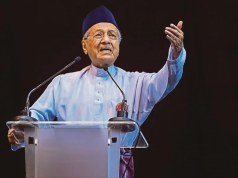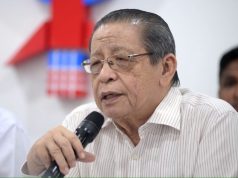PUTRAJAYA, June 25 – There is nothing to link Prime Minister Datuk Seri Najib Tun Razak to the death of Mongolian woman Altantuya Shaariibuu, the Court of Appeal, here, was told today.
Deputy Public Prosecutor Datuk Tun Abdul Majid Tun Hamzah said one could not simply make accusation or attribute anything whatsoever to Najib who was then the deputy prime minister, just because Abdul Razak Baginda happened to know Najib and DSP Musa Safri happened to be aide-de-camp of the deputy prime minister (DPM) at that time.


Abdul Razak, 50, a political analyst, was acquitted by the High Court without his defence being called on the charge of abetting two former Special Action Unit personnel, Azilah Hadri and Sirul Azhar Umar, to murder the 28-year old woman (Altantuya).
Evidence revealed that there were text messages between Abdul Razak and DSP Musa revolving around Abdul Razak seeking assistance to prevent the deceased (Altantuya) from disturbing him and his family.
DSP Musa had subsequently introduced Azilah to Abdul Razak.
Tun Abdul Majid said Azilah’s sworn statement clearly showed that whatever action he took was his and he did not receive specific instruction as to how to help Abdul Razak.
“There is nothing to link the then DPM to what the appellants (Azilah and Sirul Azhar) or Abdul Razak did,” he submitted in the appeal brought by the two policemen against their conviction and death sentence imposed on them by the Shah Alam High Court on April 9, 2009.
Azilah and Sirul Azhar were found guilty of committing the offence in Mukim Bukit Raja in Klang, near here, between 10pm on Oct 19, 2006 and 1am on Oct 20, 2006.
Tun Abdul Majid submitted that there was no relevance to call DSP Musa to testify as he (Musa) was not at the meeting between Azilah and Abdul Razak and he would not know what had transpired.
The defence had contended that the failure of the prosecution to call DSP Musa constituted a mistrial as he was the only one who could explain the more than 30 phone transactions sent from Abdul Razak’s handphone.
He also said that Azilah’s defence of alibi had been rebutted. The appeal was heard by a three-member panel comprising Justices Datuk Seri Mohamed Apandi Ali, Datuk Linton Albert and Datuk Tengku Maimun Tuan Mat.
At the end of the submission, Justice Linton questioned whether the convictions of Azilah and Sirul Azhar were safe in the light of certain aspects of the judgment of the High Court judge Datuk Mohd Zaki Md Yassin.
One of it was the issue of common intention for the two policemen to murder Altantuya. Justice Linton observed that the High Court judge did not address that issue.
“The two accused were charged under Section 302 of the Penal Code read together with Section 34 of the same Penal Code. There is no reference whatsoever whether this aspect of the charge has been established,” he said.
Tun Abdul Majid admitted that the judge did not touch on common intention but said that he had made reference to the two accused persons as first and second accused.


This led to chuckles from the public gallery but Justice Linton who was not amused, remarked: “For the two accused persons who are going to the gallows, it isn’t funny.”
Tun Abdul Majid then said that the prosecution had sufficient evidence to prove their case despite the non-direction of the trial judge on that issue.
Justice Apandi retorted, “There is a saying that man can plan, God will decide. Maybe the non-direction is ‘petunjuk tuhan’ (divine intervention). You may have a strong case, but why the judge made a non-direction?”
Earlier, Tun Abdul Majid also submitted that the prosecution had never maintained the explosives used in Altantuya’s murder were C4 explosives.
He said C4 was a specific name of explosives which were never in the evidence, adding that witnesses during the trial gave evidence that Special Action Unit officers were trained in explosives and had access to these items.
After the completion of submissions, Justice Apandi said the court reserved its decision on the appeal to a date to be fixed.
“In light of the voluminous evidence and submissions and court authority, to be fair to everybody, we will not give our decision in haste,” said Justice Apandi, adding that the court would give its written grounds.
– BERNAMA










